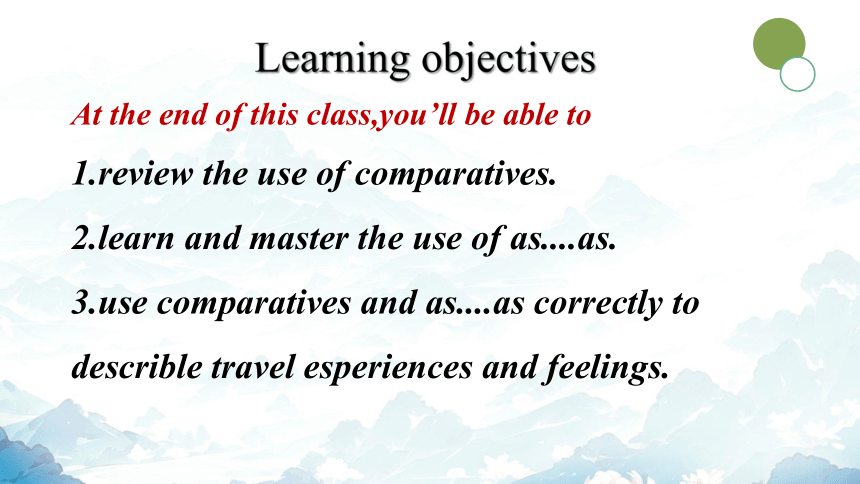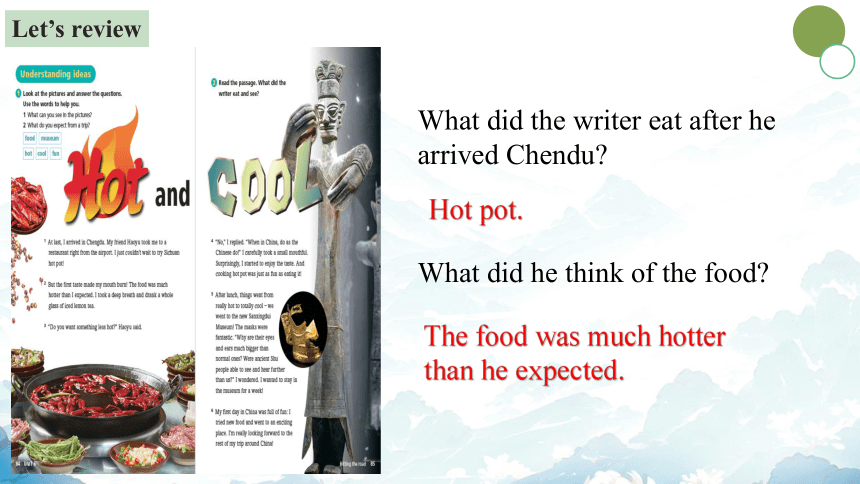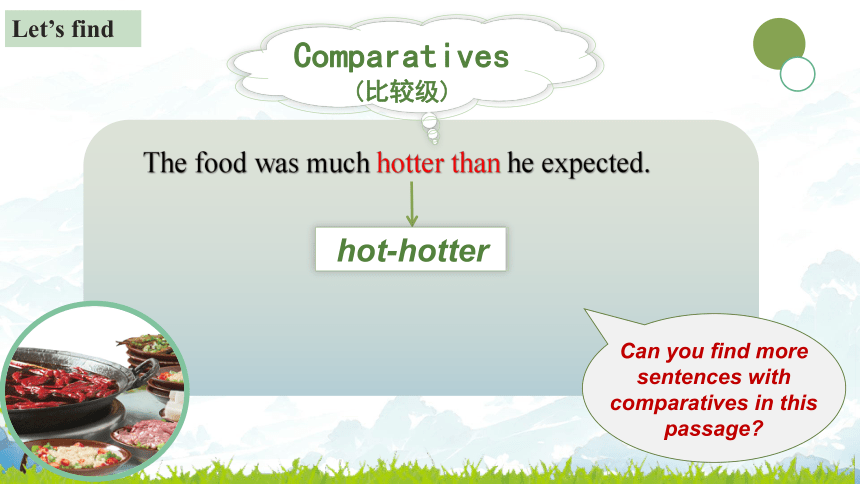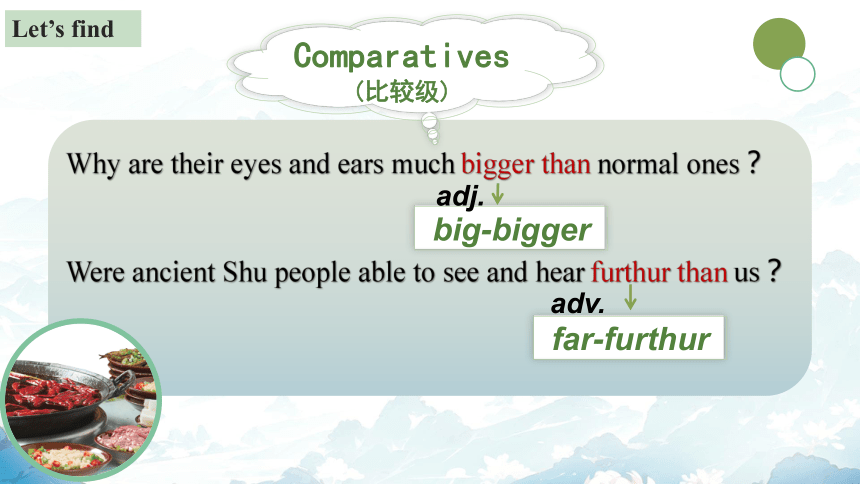Unit 6 Hitting the road第二课时课件【2025新外研版七年级英语下册】
文档属性
| 名称 | Unit 6 Hitting the road第二课时课件【2025新外研版七年级英语下册】 |  | |
| 格式 | pptx | ||
| 文件大小 | 82.4MB | ||
| 资源类型 | 试卷 | ||
| 版本资源 | 外研版 | ||
| 科目 | 英语 | ||
| 更新时间 | 2025-04-11 18:47:56 | ||
图片预览







文档简介
(共16张PPT)
Unit 6 Hitting the road
Grammar rules (第二课时)
At the end of this class,you’ll be able to
1.review the use of comparatives.
2.learn and master the use of as....as.
3.use comparatives and as....as correctly to describle travel esperiences and feelings.
Learning objectives
Lead in
Let’s review
What did the writer eat after he arrived Chendu
What did he think of the food
Hot pot.
The food was much hotter than he expected.
The food was much hotter than he expected.
Let’s find
Comparatives (比较级)
hot-hotter
Can you find more sentences with comparatives in this passage
Why are their eyes and ears much bigger than normal ones?
Let’s find
Comparatives (比较级)
big-bigger
Were ancient Shu people able to see and hear furthur than us?
far-furthur
adj.
adv.
Review
一、定义
Comparatives (比较级)
二、变化规律
三、用法
四、练习
一、定义:在对两者进行比较时,要用到___________和____________的比较级。
二、形容词和副词比较级的变化规则。
1.规则变化 规则 原级 比较级 最高级
直接在词尾+er/est tall taller tallest
以e结尾,直接+er/est late later latest
辅音字母+y结尾,变”y” 为“i”,再加er/est. early heavy earlier heavier earliest
heaviest
以重读闭音节结尾的词,如末尾只有一个辅音字母,应双写末尾辅音字母再+er/est big hot bigger hotter biggest
hottest
大部分双音节和多音节词,在前面加more/most careful beautiful more careful more beautiful most careful
most beautiful
2.不规则变化 good/well better best
bad/badly/ill worse worst
many/much more most
little less least
far farther/further farthest/furthest
old older/elder oldest/eldest
形容词
副词
Review
三、用法:形容词、副词的比较级和最高级用于比较不同人或事物的性质、特征或动作的程度
1.比较级的用法
1) 两者比较:用于比较两个人或事物的性质、特征等,表明一方比另一方更具有某种性质或特征,常与“than”连用。
如“He is taller than his brother.”(他比他哥哥高。)
“She runs faster than me.”(她跑得比我快。)
2) 修饰比较级的词:可以用“much”“a lot”“even”“far”“a little”“a bit”
如“This book is much more interesting than that one.”(这本书比那本书有趣得多。)
“It's a little colder today than yesterday.”(今天比昨天稍微冷一点。)
3)“the + 比较级...,the + 比较级...”结构:表示“越……,越……”。例如“The more you practice, the better you will be.”(你练习得越多,就会做得越好。)
4) “more and more + 原级”或“less and less + 原级”结构:表示“越来越……”或“越来越不……”。
如“The city is becoming more and more beautiful.”(这座城市变得越来越美丽。)
2.最高级的用法
1) 三者或以上比较:用于在三个或三个以上的人或事物中进行比较,表明某个人或事物在某方面的程度最高。最高级前一般要加定冠词“the”,后面常跟“of”或“in”短语表示比较范围。
如“He is the tallest in his class.”(他是他班上最高的。)
“This is the most beautiful flower of all.”(这是所有花中最漂亮的。)
2) 副词最高级:副词最高级前的“the”可以省略。
如“He runs (the) fastest in our school.”(他在我们学校跑得最快。)
3)最高级的修饰语:可以用“by far”“almost”“nearly”等词修饰最高级。
如“This is by far the most difficult problem I've ever solved.”(这是我迄今为止解决过的最难的问题。)
Review
Let’s learn
And cooking hot pot was just as fun as eating it.
1.在肯定句中,用“as……as”表示和......一样
A + be动词+ as + adj. + as + B.
A + 动词+ as + adv. + as + B.
和...一样有趣
如:My pen is as new as yours.
Betty runs as fast as Lily.
2.在否定句中,用“as……as”表示和......不一样
A + be动词+ not + as + adj+ as + B.
A + 助动词+not+动词+ as + adv. + as + B.
如:Xiong is not as/so tall as Xiao.
Tara doesn’t run as/so fast as Tina.
Practice
莉莉不和玛丽一样高。
你和你和姐姐一样瘦。
这把尺子根那把尺子一样长。
我们的学校没有你们的大。
Practice
Rewrite the sentences using (more / less)... than or as... as.
more enjoyable than /
better than
as comfortable
as
Practice
Complete the postcard using as... as or (more)... than.
bigger than
as powerful as
as beautiful as
more interesting than
as exciting as
as little as
Practice
Why do we use “as...as”to compare?
Discuss
Discuss fun things to do while travelling and put them in the thinking map.
Homework
Must do:
1.Finish exercises in your exercise book.
2.Write a short passage with the useful words and expressions in this unit to show your interesting travel experiences and feelings.
Choose to do:
Make a short video to introduce fun things to do in Guang’an.
Unit 6 Hitting the road
Grammar rules (第二课时)
At the end of this class,you’ll be able to
1.review the use of comparatives.
2.learn and master the use of as....as.
3.use comparatives and as....as correctly to describle travel esperiences and feelings.
Learning objectives
Lead in
Let’s review
What did the writer eat after he arrived Chendu
What did he think of the food
Hot pot.
The food was much hotter than he expected.
The food was much hotter than he expected.
Let’s find
Comparatives (比较级)
hot-hotter
Can you find more sentences with comparatives in this passage
Why are their eyes and ears much bigger than normal ones?
Let’s find
Comparatives (比较级)
big-bigger
Were ancient Shu people able to see and hear furthur than us?
far-furthur
adj.
adv.
Review
一、定义
Comparatives (比较级)
二、变化规律
三、用法
四、练习
一、定义:在对两者进行比较时,要用到___________和____________的比较级。
二、形容词和副词比较级的变化规则。
1.规则变化 规则 原级 比较级 最高级
直接在词尾+er/est tall taller tallest
以e结尾,直接+er/est late later latest
辅音字母+y结尾,变”y” 为“i”,再加er/est. early heavy earlier heavier earliest
heaviest
以重读闭音节结尾的词,如末尾只有一个辅音字母,应双写末尾辅音字母再+er/est big hot bigger hotter biggest
hottest
大部分双音节和多音节词,在前面加more/most careful beautiful more careful more beautiful most careful
most beautiful
2.不规则变化 good/well better best
bad/badly/ill worse worst
many/much more most
little less least
far farther/further farthest/furthest
old older/elder oldest/eldest
形容词
副词
Review
三、用法:形容词、副词的比较级和最高级用于比较不同人或事物的性质、特征或动作的程度
1.比较级的用法
1) 两者比较:用于比较两个人或事物的性质、特征等,表明一方比另一方更具有某种性质或特征,常与“than”连用。
如“He is taller than his brother.”(他比他哥哥高。)
“She runs faster than me.”(她跑得比我快。)
2) 修饰比较级的词:可以用“much”“a lot”“even”“far”“a little”“a bit”
如“This book is much more interesting than that one.”(这本书比那本书有趣得多。)
“It's a little colder today than yesterday.”(今天比昨天稍微冷一点。)
3)“the + 比较级...,the + 比较级...”结构:表示“越……,越……”。例如“The more you practice, the better you will be.”(你练习得越多,就会做得越好。)
4) “more and more + 原级”或“less and less + 原级”结构:表示“越来越……”或“越来越不……”。
如“The city is becoming more and more beautiful.”(这座城市变得越来越美丽。)
2.最高级的用法
1) 三者或以上比较:用于在三个或三个以上的人或事物中进行比较,表明某个人或事物在某方面的程度最高。最高级前一般要加定冠词“the”,后面常跟“of”或“in”短语表示比较范围。
如“He is the tallest in his class.”(他是他班上最高的。)
“This is the most beautiful flower of all.”(这是所有花中最漂亮的。)
2) 副词最高级:副词最高级前的“the”可以省略。
如“He runs (the) fastest in our school.”(他在我们学校跑得最快。)
3)最高级的修饰语:可以用“by far”“almost”“nearly”等词修饰最高级。
如“This is by far the most difficult problem I've ever solved.”(这是我迄今为止解决过的最难的问题。)
Review
Let’s learn
And cooking hot pot was just as fun as eating it.
1.在肯定句中,用“as……as”表示和......一样
A + be动词+ as + adj. + as + B.
A + 动词+ as + adv. + as + B.
和...一样有趣
如:My pen is as new as yours.
Betty runs as fast as Lily.
2.在否定句中,用“as……as”表示和......不一样
A + be动词+ not + as + adj+ as + B.
A + 助动词+not+动词+ as + adv. + as + B.
如:Xiong is not as/so tall as Xiao.
Tara doesn’t run as/so fast as Tina.
Practice
莉莉不和玛丽一样高。
你和你和姐姐一样瘦。
这把尺子根那把尺子一样长。
我们的学校没有你们的大。
Practice
Rewrite the sentences using (more / less)... than or as... as.
more enjoyable than /
better than
as comfortable
as
Practice
Complete the postcard using as... as or (more)... than.
bigger than
as powerful as
as beautiful as
more interesting than
as exciting as
as little as
Practice
Why do we use “as...as”to compare?
Discuss
Discuss fun things to do while travelling and put them in the thinking map.
Homework
Must do:
1.Finish exercises in your exercise book.
2.Write a short passage with the useful words and expressions in this unit to show your interesting travel experiences and feelings.
Choose to do:
Make a short video to introduce fun things to do in Guang’an.
同课章节目录
